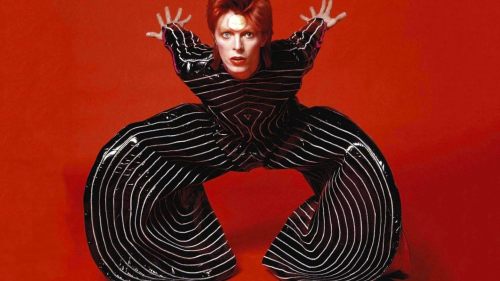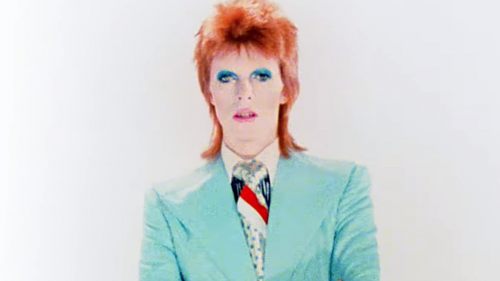Review: DAVID BOWIE: THE LAST FIVE YEARS
Somehow David Bowie is both ever-present and a haunting absence at the center of David Bowie: The Last Five Years. Archival footage abounds, unprecedented access is granted, but there's a Bowie-shaped hole in this doc - and that's totally intentional. Director Francis Whately understands his subject well, and in creating a kind of psychic negative space in his feature-length exploration of Bowie's final years, he not only honors his subject's exacting control over his public image - he becomes his final collaborator.
A prologue outlines the circumstances of Bowie’s final tour and the 2004 heart attack that took him offstage for good. The doc then picks up seven years later and, taking a cue from its subject, uses Bowie’s final creations to vividly illustrate his final creative bursts while also looking backward at a life of artistry. Each featured creation from the “now” - songs, videos, a stage musical - is broken down into its elements and explored, but is then loaded into a temporal telescope and used to look back at a facet of Bowie’s 50-year body of work.
So 2013's “The Stars (Are Out Tonight)” - in this author’s opinion, one of Bowie’s best songs in 20 years - has its arrangement, lyrics, and music video given thorough attention, but it also serves as a vestibule for a section examining Bowie’s lifelong relationship with fame. “Where Are We Now?”, in which Bowie wistfully recalls traversing Berlin in his younger days, is our gateway to the 1977-79 period in which Bowie exiled himself in the German city to reground himself psychologically and free himself musically. “Blackstar” sends us on a journey into the songwriter’s career-long relationship with Major Tom; the 2015 Off-Broadway musical Lazarus, which premiered a month before Bowie’s death, gives us cause to reflect on Bowie’s unsuccessful attempt to turn George Orwell’s 1984 into a musical (that project became Diamond Dogs, and birthed that album’s wildly elaborate live tour). The musical also gives Bowie an opportunity to put his alien outsider character to rest, and to maybe get his head around the idea of his own death.
Though the doc opens with a statement that it will be told “in his own words”, much of the stories come from Bowie’s collaborators, interviewed individually and in groups. These group interviews are especially mournful: the musicians who backed the artist on The Next Day and Blackstar (among them Earl Slick, Gail Ann Dorsey, Maria Schneider and Donny McCaslin) are gathered in loose formation with their instruments, musically taking us through various tracks. Bowie is of course missing, and so these jams take on the air of a wake. The band members tell stories of the recording sessions, but they tell them to each other, as if to convince themselves it really happened. Fittingly, Bowie’s visual collaborators are given as much import as his aural colleagues, with Floria Sigismondi, Indrani Pal-Chaudhuri, Tony Oursler and Johan Renck walking us through the videos they created for the final two albums. Likewise, the theater professionals who brought Lazarus to the stage relate Bowie’s intentions as they interpreted them. Throughout, producer Tony Visconti, who’s been with Bowie off and on since around 1970, provides heartfelt running commentary and insight. Taken together, there’s a gentle sense in these interviews of people answering a call beyond professionalism or friendship. These are apostles and, now, guardians.
It’s not a comprehensive documentary. Certain chapters of Bowie’s career are left wholly unexplored, simply because in his final two albums and stage musical, those parts of his body of work aren’t revisited. So you’ll be hard pressed to find any whispers of his ‘90s output here; a Tin Machine cassette is bemusedly glimpsed in a gas station bargain rack. The Glass Spider Tour is forgotten. But lord help us if, at the end of our own lives, we’re denied the dignity of choosing what parts we want to remember. Along the way, The Last Five Years casually drops a wealth of previously unseen archival footage, and it synthesizes moments out of footage spanning five decades with a freedom unencumbered by chronology or literal-mindedness.
There’s a pervasive sadness to the whole thing - how could there not be? - but anyone looking for ghoulish details about Bowie’s final days will deservedly come up empty here. Though there are a handful of mentions of Bowie informing some of these folks of his illness, the doc smartly avoids ever getting maudlin, and instead focuses on showcasing how Bowie used his final years to tie up the creative threads of his life, giving us the sense that The Thin White Duke departed the planet with nothing left unfinished. It’s tidy, but that’s because it was orchestrated by one of the greatest aesthetes of our age. And there’s a surprising amount of comfort in seeing that orchestrator in control of his own image one last time.



